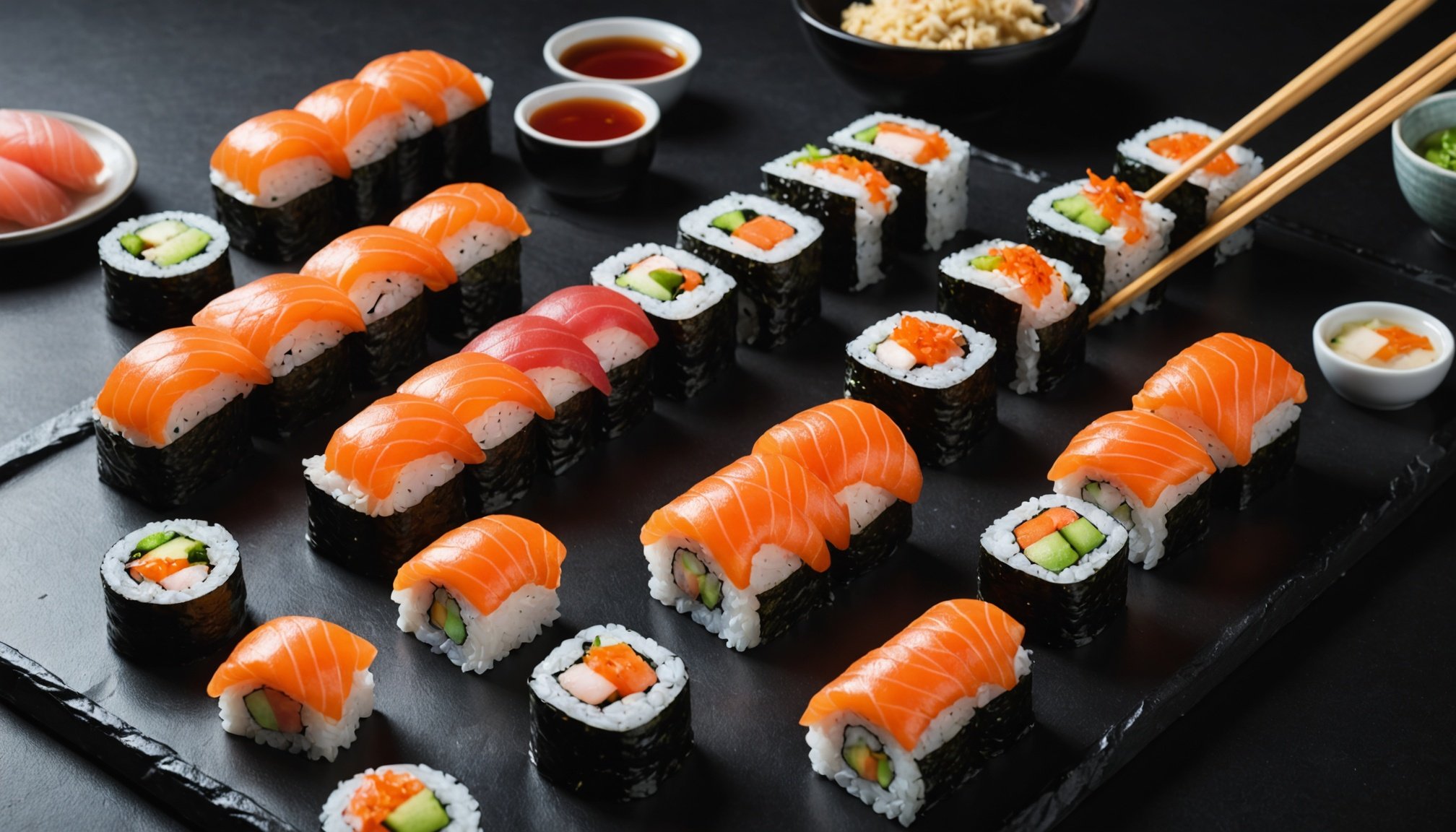Launching a sushi bar involves more than just crafting delicious dishes; effective digital marketing is vital for attracting customers and building a loyal following. From mastering local SEO to leveraging social media, these strategies can elevate your new venture. Understand your audience and communicate authentically. Explore unique content ideas that reflect your brand's personality, while enticing sushi lovers to choose your establishment. With the right approach, your sushi bar can thrive in an increasingly competitive market.
Understanding Your Target Market
Identifying the ideal customer profile for a sushi bar is crucial for success. Start by creating detailed customer personas. These personas help you visualize your target audience, including their preferences and habits. Use market research to refine these profiles, ensuring they align with real-world data.
Also to see : Creative strategies to successfully unveil your restaurant”s newest menu sensation
Conducting surveys and interviews provides valuable insights into your target audience. By asking the right questions, you can uncover dining preferences and expectations. This data aids in tailoring your offerings to meet customer needs. For instance, understanding whether your audience prefers traditional sushi or fusion varieties can guide menu development.
Analyzing local demographics is another key step. Consider factors such as age, income, and cultural background. These elements influence dining preferences and can help pinpoint your ideal customer profile. For example, a younger demographic might favor trendy, Instagram-worthy dishes, while an older audience might appreciate more traditional fare.
Also to see : Crucial crisis training for bartenders: equipping teams for unforeseen challenges
Key Steps to Understanding Your Market
- Create customer personas to visualize your audience.
- Conduct surveys and interviews for firsthand insights.
- Analyze local demographics to inform your strategy.
By focusing on these strategies, you ensure your sushi bar resonates with its target audience, ultimately driving success and customer satisfaction.
Building a Strong Brand Identity
Creating a compelling brand identity is essential for any sushi bar aiming to stand out. A well-designed logo and cohesive visual elements are the foundation of brand development. These components should reflect the essence of your sushi bar and be easily recognizable.
A unique value proposition is crucial in brand development. It sets your sushi bar apart from competitors. Consider what makes your offerings special—be it the freshness of ingredients, innovative menu items, or exceptional service. This proposition should be clear and resonate with your target audience.
Brand messaging is another critical element. It needs to communicate the core values and promises of your sushi bar. Craft messages that are engaging and reflective of your brand’s personality. This ensures a consistent experience across all customer touchpoints.
Key Elements of Brand Development
- Logo design: Memorable and reflective of your brand.
- Unique value proposition: What makes you different.
- Brand messaging: Engaging and consistent.
By focusing on these aspects of brand development, you can create a strong identity that resonates with customers. This not only attracts new patrons but also fosters loyalty among existing ones, ensuring long-term success.
Implementing Effective SEO Strategies
Harness the power of SEO to elevate your sushi bar's online presence.
Conducting Keyword Research
Effective search engine optimization begins with thorough keyword research. Identify terms related to sushi and local dining that potential customers might use. This involves analyzing search volumes and competition to select the most impactful keywords. For instance, phrases like "best sushi near me" or "local sushi bar specials" can guide content strategy.
Optimizing Website Content
Once you have a list of keywords, integrate them naturally into your website content. This includes titles, meta descriptions, and body text. Aim to create engaging and informative content that appeals to both search engines and human readers. Additionally, ensure your website is mobile-friendly and fast-loading, as these factors contribute to higher search rankings.
Utilizing Local SEO Tactics
Local SEO is crucial for attracting nearby customers. Claim and optimize your business listing on platforms like Google My Business. Encourage satisfied customers to leave reviews, as positive feedback enhances your online reputation. Moreover, use location-specific keywords to target local searches effectively.
- Benefits of Local SEO
- Increased visibility in local search results
- Enhanced customer trust through reviews
- Improved online presence in your community
By focusing on these SEO strategies, you can drive more traffic to your sushi bar and increase customer engagement.
Leveraging Social Media Marketing
Harnessing the power of social media can transform your sushi bar's visibility and customer engagement.
Selecting the Right Platforms
Choosing the appropriate social media platforms is crucial for effective marketing. Consider where your target audience spends their time. Instagram, with its visual focus, is perfect for showcasing sushi dishes, while Facebook offers a broader reach and community-building features.
Creating Visually Appealing Content
Developing visually appealing content is essential. High-quality images of your sushi creations can captivate potential customers. Use vibrant colors and creative angles to highlight the freshness and artistry of your dishes. A consistent posting schedule ensures your content remains in followers' feeds.
Engaging with Followers
Building a community requires active engagement with followers. Respond to comments and messages promptly to foster a sense of connection. Host interactive sessions like Q&A or live sushi-making demonstrations to keep your audience involved. Encourage user-generated content by asking customers to share their dining experiences.
Benefits of Social Media Engagement:
- Strengthens customer relationships
- Increases brand loyalty
- Drives word-of-mouth marketing
By implementing a robust social media strategy, you can enhance your sushi bar's online presence and cultivate a loyal customer base. This approach not only attracts new patrons but also maintains ongoing interest and engagement.
Designing Email Marketing Campaigns
Elevate customer retention with strategic email marketing.
Building an Email List
Email marketing begins with establishing a robust email list. Start collecting emails from day one through sign-up forms on your website or in-store prompts. Consider offering incentives like discounts to encourage sign-ups. A well-curated list is the foundation for effective customer retention strategies.
Crafting Compelling Newsletters
Create newsletters that captivate your audience. Focus on engaging content, such as exclusive promotions or behind-the-scenes looks at your sushi bar. Use clear and enticing subject lines to increase open rates. Incorporate visually appealing elements and ensure your newsletters are mobile-friendly.
Analyzing Email Performance Metrics
Regularly assess your email performance metrics to refine your approach. Monitor open rates, click-through rates, and conversion rates to gauge effectiveness. Use this data to adjust your strategies and improve customer retention. A/B testing different elements can also provide insights into what resonates best with your audience.
- Key Metrics to Track:
- Open Rate
- Click-Through Rate
- Conversion Rate
By focusing on these email marketing strategies, you can enhance engagement and foster loyalty, ultimately boosting your sushi bar's success.
Utilizing Influencer Partnerships
Enhance your sushi bar's visibility through strategic collaborations.
Identifying Local Food Influencers
To maximize the potential of influencer marketing, start by identifying local food influencers who align with your brand's values. Look for individuals with a genuine passion for sushi and a strong local following. These influencers can become effective brand ambassadors, sharing their authentic dining experiences with their audience.
Structuring Collaboration Agreements
Once potential partners are identified, it's crucial to structure collaboration agreements that are mutually beneficial. Clearly outline expectations, deliverables, and compensation. Consider offering exclusive dining experiences or menu previews as part of the agreement. This ensures that both parties understand their roles and the benefits of the partnership.
Measuring the Impact
To assess the effectiveness of your influencer campaigns, establish clear metrics for success. Track changes in brand awareness by monitoring social media engagement and new customer inquiries. Use tools to measure increases in followers and engagement rates. Analyze this data to refine future collaborations and ensure continued growth.
Key Metrics to Track:
- Increase in social media followers
- Engagement rate changes
- Customer inquiries generated
By leveraging influencer marketing and forming strategic partnerships, your sushi bar can significantly enhance its brand presence and attract new patrons.
Engaging with Online Reviews and Reputation Management
Strengthening your sushi bar's reputation management is vital for long-term success.
Encouraging Customer Reviews
To build a positive online presence, actively encourage customers to leave online reviews on platforms like Yelp and Google. Consider placing gentle reminders on receipts or at the end of the dining experience. Offering small incentives, like a discount on the next visit, can further motivate patrons to share their feedback.
- Platforms for Reviews:
- Yelp
- TripAdvisor
Responding to Feedback
Responding to both positive and negative customer feedback is crucial. Acknowledge positive comments to show appreciation and address any concerns raised in negative reviews promptly. This not only improves your reputation management but also demonstrates commitment to customer satisfaction, fostering loyalty.
Utilizing Feedback for Improvement
Use online reviews as a tool to refine menu offerings and enhance customer service. Analyzing feedback can highlight areas for improvement, such as popular dishes or service speed. Implementing changes based on customer feedback not only enhances the dining experience but also strengthens your sushi bar's reputation.
By focusing on these strategies, you can effectively manage your online presence and ensure your sushi bar remains a top choice for diners.
Analyzing and Adjusting Marketing Strategies
Understanding the effectiveness of your marketing efforts is essential for success.
Utilizing Analytics Tools
To effectively track marketing performance, use robust analytics tools. These platforms provide insights into key marketing metrics such as website traffic, conversion rates, and customer engagement. By regularly reviewing this data, you can gain a comprehensive understanding of which strategies are working and which need refinement.
Making Data-Driven Adjustments
With insights from analytics, you can make data-driven decisions to optimize your strategies. Identify underperforming areas and adjust tactics accordingly. For instance, if a social media campaign isn't generating expected engagement, consider altering the content or targeting a different audience segment.
- Adjustments to Consider:
- Altering content types
- Retargeting specific audiences
- Timing of campaign releases
Setting Measurable Goals
Establishing clear, measurable goals is crucial for ongoing marketing efforts. Define specific objectives, such as increasing website visits by 20% in three months or boosting newsletter sign-ups by 15%. These goals provide direction and enable you to assess progress effectively.
By focusing on these strategies, you can ensure your marketing initiatives are both effective and adaptable, driving continuous improvement and success.













